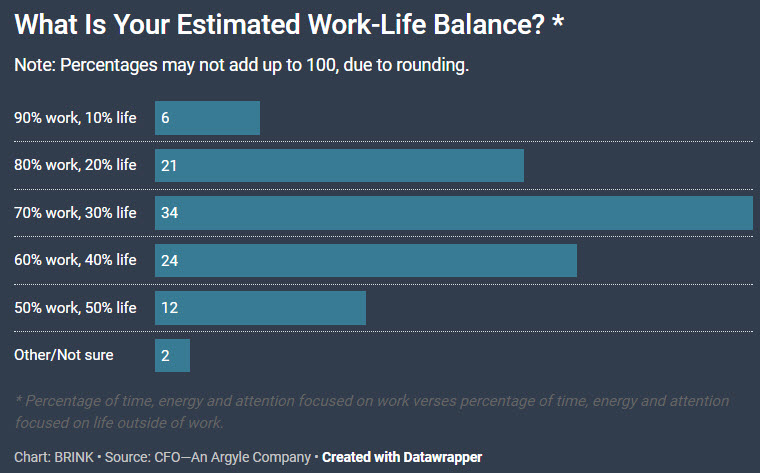This article first appeared in BRINK.
A recent survey conducted by Duke University and Grenoble École de Management revealed that most CFOs are working an unhealthy 70 hours a week and would prefer to be working close to 50 hours. And CFOs who do work 50 hours a week would prefer to work 40.
Furthermore, according to a CFO survey, only 12 percent of senior finance executives manage to maintain a 50-50 work-life balance (see Figure below).

New Technologies Bring New Responsibilities
The long hours are attributable to an increased role for CFOs, who are responsible for both financial stability and long-term corporate strategy—while facing new challenges in governance, talent strategy, cyber risk, and the use of emerging technologies. As machine learning, AI, and blockchain become integral to all parts of a business, and particularly finance, some predict that the IRS will be collecting taxes via blockchain by 2021 and that AI will account for 30 percent of audits by 2023. CFOs, therefore, have little choice but to acquaint themselves with these technologies.
The CFO, of course, is not the only senior executive who puts in long hours. All senior executives face extremely high job demands and significant pressure to perform. Junior employees are also prone to overwork, whether pushed by their managers or pulled by always-on technology that doesn’t allow people to disconnect.
Burnout is Almost Universal
According to The Wall Street Journal, a Harvard Medical School study found that some 96 percent of senior leaders feel somewhat burned out, and a third describe the syndrome as extreme. These high achievers often feel that they are indispensable and have (or think they have) near-superhuman stamina and resilience.
Whatever the reason for overwork, no senior leadership role can maintain such an unsustainable level of hours logged, week in and week out. A large body of research suggests that long hours usually backfire for both people and their companies, in terms of health issues and lagging productivity. Overwork leads to stress and exhaustion, which can be masked in the short term, but over the long term it leads to faulty decision-making, poor communications, and jumpy emotions.
A Tale of Diminishing Returns
According to the Harvard Business Review, numerous studies by Marianna Virtanen of the Finnish Institute of Occupational Health and her colleagues (as well as other studies) have found that overwork and the resulting stress risks a range of health problems, including impaired sleep, depression, heavy drinking, diabetes, impaired memory, and heart disease.
In a study of consultants by Erin Reid, a professor at Boston University’s Questrom School of Business, managers could not tell the difference between employees who actually worked 80 hours a week and those who just pretended to, suggesting that overwork does not improve productivity.
In sum, the story of overwork is literally a story of diminishing returns: Keep overworking, and you’ll work in a progressively careless manner on tasks that are increasingly meaningless.
How to Protect Your Time
To address these health and productivity issues, CFOs and other senior leaders must protect their most precious resource—time—which is being stolen from them by excessive work demands. To help protect time, here are three practices that have proved to be useful:
Value Personal “Slow Time”
Most leaders’ diaries are jammed with executive meetings, personnel issues, and reading papers and emails. Calendars are full and constantly juggled to squeeze in more events. Much has been written on the value of “slow time” and how leaders need to make time to step back from the business, relax, and take time to think.
To create time for reflection, put two 45-minute slots in your calendar a day to help you step away from your desk and mobile. Find a quiet place where you can step back and reflect on what is happening and how to be more impactful in your work.
One leader goes to a nearby park. If the weather is good, he sits on the bench; if it is raining, he walks with an umbrella. Such breaks allow him to return to work refreshed, energized, and productive.
Delegate Something You Enjoy
Rather than delegating “low value,” boring, or administrative pieces of your role that don’t motivate people and that you often have to check and redo, list your top five favorite things to do. Now pick two of them that you can delegate to members of your team.
You will find that they are more motivated because you have asked them to do something that they know you consider important. That will spur them to do a great job—and free up your time.
Use Your First 15 Minutes Wisely
Your first 15 minutes in the office can set the tone for the rest of the day. Rather than diving straight into a meeting or reading email, try to use the first 15 minutes, in three minute chunks, to:
- Walk around the office and talk to people—ideally connecting with people you don’t normally speak with.
- Read something that you would not normally read—poetry, literature, a different newspaper.
- Step back and plan the day—taking time to reflect and think about what you want to achieve.
Simple steps such as these help increase blood flow, build new working relationships, stimulate the mind with new reading, and ensure that you start the day feeling in control.
The challenge is to take the time you gain and use it to do something other than work. Short-term and long-term, this will have a positive impact on your work productivity—and your health.


